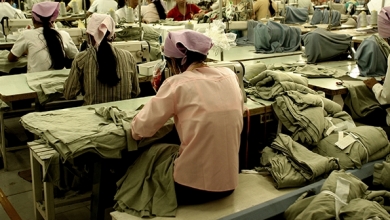
Learn about the hidden “benefits” you get every time you buy something that is counterfeit. Continue reading 7 Great Things about Buying Counterfeits

Learn about the hidden “benefits” you get every time you buy something that is counterfeit. Continue reading 7 Great Things about Buying Counterfeits
Costco Wholesale Corp. customer sued the retailer on allegations that it knowingly sold frozen prawns that were the product of slave labor. Continue reading Costco Faces Lawsuit over Sale of Prawns Allegedly Farmed by Slave Labor

Every day, millions of Americans use products or eat foods that are produced by slave labor. Rare metals from Africa are embedded in our cell phones. Harvested fish or fruit or fabric are thawing in our fridge or hanging in our closets. Continue reading You Probably Benefitted From Slave Labor Today

In the eastern Chinese city of Wuxi, home to the world’s biggest maker of solar panels, labour is so cheap that workers carry out jobs by hand while machines designed to perform the same tasks sit idle.
The low cost of labour, coupled with the massive scale of production at its 14,000-person plant, have enabled China’sSuntech to become the global industry leader in just a decade.
Chinese producers now dominate the global solar power business. But their success has become a major global trade issue as American companies accuse them of dumping in the US market and receiving unfair subsidies from Beijing.
The US government is due to announce findings on the issue later this month, which could result in duties against Chinese manufacturers.
Suntech denies unfair business practices have helped make it the world’s largest producer, but it makes no secret of its strategy of keeping prices low to boost sales and make solar power available to more people.
“We don’t believe we have any unfair subsidies or anything like that,” said Suntech’s vice president for global marketing Edwin Huang. “We just hope it doesn’t turn into a full-scale trade war. It’s not good for anyone.”
US companies have accused China of improperly subsidising its solar sector as part of a no-holds-barred commercial battle for supremacy over an industry experts estimate will be worth trillions of dollars in the future.
They say Chinese competitors have access to cheap financing from state-owned banks and outright government subsidies aimed at building up the industry, as Beijing makes alternative energy a priority.
At least three US solar companies collapsed last year as global prices slumped, among them Solyndra, which had a $535 million loan guarantee from US President Barack Obama’s administration.
Evergreen Solar, once listed on the Nasdaq exchange, and high-profile Intel spin-off SpectraWatt also shut down.
Continue reading China solar giant faces glare of US trade war

David Paul – President, Fiscal Strategies Group – Posted: 02/13/2012 8:30 am
Apple aficionados suffered a blow a couple of weeks ago. All of those beautiful products, it turns out, are the product of an industrial complex that is nothing if not one step removed from slave labor.
But of course there is nothing new here. Walmart has long prospered as a company that found ways to drive down the cost of stuff that Americans want. And China has long been the place where companies to go to drive down cost.
For several decades, dating back to the post World War II years, relatively unfettered access to the American consumer has been the means for pulling Asian workers out of deep poverty. Japan emerged as an industrial colossus under the tutelage of Edward Deming. The Asian tigers came next. Vietnam and Sri Lanka have nibbled around the edges, while China embraced the export-led economic development model under Deng Xiaoping.
While Apple users have been beating their breasts over the revelations of labor conditions and suicides that sullied their glass screens, the truth is that Foxconn is just the most recent incarnation of outsourced manufacturing plants — textiles and Nike shoes come to mind — where working conditions are below American standards. Continue reading Can Manufacturing Jobs Come Back? What We Should Learn From Apple and Foxconn
You must be logged in to post a comment.